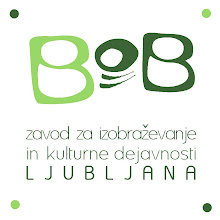We have two representatives of the Intercultural Navigators from the UK - Aime and Sarah:
Sarah is working for YDance (Scottish Youth Dance), the National Youth Dance Agency for Scotland.
Aime is not formally involved with young people but has always had an interest in working with them. In 2003, he initiated and implemented a six month project that linked newly arrived ethnic minority young people in the UK with career advisers so they can be informed on how the UK employment system works. Currently he is working on the possibility to launch another youth project that involve young people discussing current issue they face in the UK and potential solutions to these problems.
Here is some information about Intercultural Navigators project:
Sarah is working for YDance (Scottish Youth Dance), the National Youth Dance Agency for Scotland.
Aime is not formally involved with young people but has always had an interest in working with them. In 2003, he initiated and implemented a six month project that linked newly arrived ethnic minority young people in the UK with career advisers so they can be informed on how the UK employment system works. Currently he is working on the possibility to launch another youth project that involve young people discussing current issue they face in the UK and potential solutions to these problems.
Here is some information about Intercultural Navigators project:
 Recent research carried out by British Council shows that Europe’s next generation of leaders are truly concerned about intercultural issues. In response to their concerns, the British Council has initiated Intercultural Navigators – a project that will deal with the challenges that we face in this multicultural world.
Recent research carried out by British Council shows that Europe’s next generation of leaders are truly concerned about intercultural issues. In response to their concerns, the British Council has initiated Intercultural Navigators – a project that will deal with the challenges that we face in this multicultural world.Intercultural Navigators will develop groups of young leaders in Europe who can easily ‘navigate’ within and between different cultures – who are aware of their own cultural backgrounds and who are able and open enough to accept, respect and understand other cultures. A large-scale project will be organised in partnership with a diverse group of institutions and experts working in the area of leadership development and intercultural literacy from the UK, Europe and Africa.
The participants - “Navigators” will be able to contribute to current debates surrounding issues such as:
· Diaspora communities and their relationships with home and receiving societies,
· The unprecedented movement of people between new and old EU member states,
· The importance of intercultural competencies in global business,
· How well integrated intercultural understanding is in policy making at a all levels,
· How well leaders from ‘fortress’ Europe, Africa and other regions are linked together,
· How well developed is participation at all levels of society and is this participation having a positive impact when addressing the roots of violent extremism.
The Intercultural Navigators project will run in 16 European countries with 30–70 participants in each country, who will all come together in a global on-line community and share experiences and knowledge in the field of intercultural dialogue. Participants will be enabled to effect change in their own countries, institutions and communities based on participation, consultation and the creation of an enabling environment.
Who are Intercultural Navigators?
The Intercultural Navigators Programme seeks to bring together those with a desire to make a significant positive contribution to society; people who are want to learn, are open minded, curious, and willing to share their own experiences and at the same time actively seek new perspectives. The programme aims to achieve a balance of diversity in terms of religion, gender, disability, ethnicity, class, sectors (private/public/civil society) and geographical balance (rural/urban and regional/provincial), in order to reflect and impact across society at country level. The selection criteria will be centred around your potential to make a genuine difference.
About this last sentence – are we not solidifying these differences if we make them explicit – AI says ‘The language use makes your reality’?
The participants - “Navigators” will be able to contribute to current debates surrounding issues such as:
· Diaspora communities and their relationships with home and receiving societies,
· The unprecedented movement of people between new and old EU member states,
· The importance of intercultural competencies in global business,
· How well integrated intercultural understanding is in policy making at a all levels,
· How well leaders from ‘fortress’ Europe, Africa and other regions are linked together,
· How well developed is participation at all levels of society and is this participation having a positive impact when addressing the roots of violent extremism.
The Intercultural Navigators project will run in 16 European countries with 30–70 participants in each country, who will all come together in a global on-line community and share experiences and knowledge in the field of intercultural dialogue. Participants will be enabled to effect change in their own countries, institutions and communities based on participation, consultation and the creation of an enabling environment.
Who are Intercultural Navigators?
The Intercultural Navigators Programme seeks to bring together those with a desire to make a significant positive contribution to society; people who are want to learn, are open minded, curious, and willing to share their own experiences and at the same time actively seek new perspectives. The programme aims to achieve a balance of diversity in terms of religion, gender, disability, ethnicity, class, sectors (private/public/civil society) and geographical balance (rural/urban and regional/provincial), in order to reflect and impact across society at country level. The selection criteria will be centred around your potential to make a genuine difference.
About this last sentence – are we not solidifying these differences if we make them explicit – AI says ‘The language use makes your reality’?







